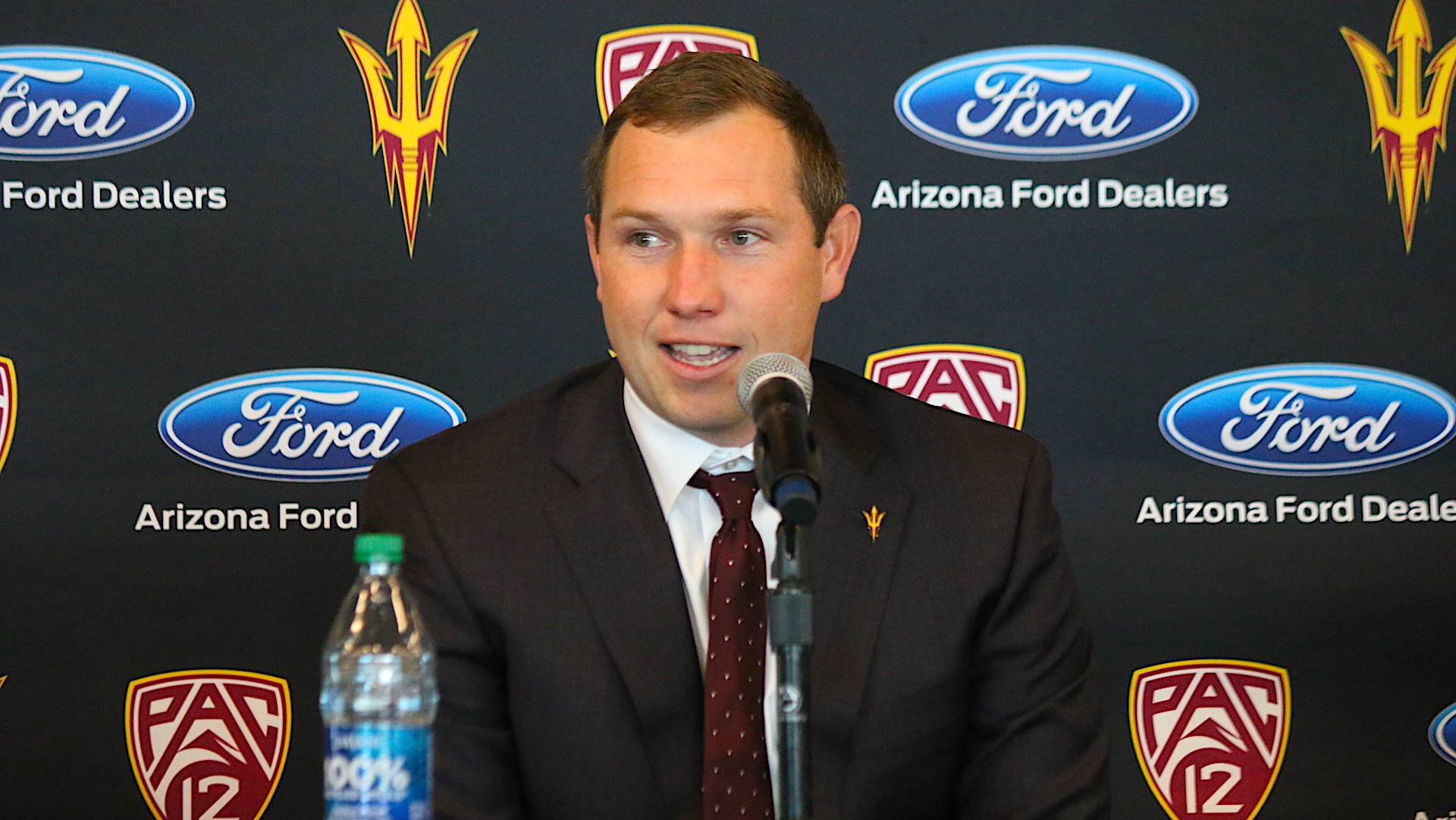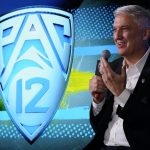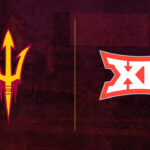Arizona State spent more than two months looking for a head coach but wasted no time hiring one.
One day after the Sun Devils wrapped up a gloomy season, they had Oregon offensive coordinator Kenny Dillingham en route to Tempe to accept an offer from his alma mater.
On Sunday, the 32-year-old was introduced as the 26th head coach in ASU history.
More importantly, the development came one week before the opening of the transfer portal and three weeks before the early signing window for high school recruits.
 Dillingham isn’t a great hire or even a good hire. From our vantage point — and with an admittedly high bar — only proven winners can be considered elite hires: Lincoln Riley to USC, for example.
Dillingham isn’t a great hire or even a good hire. From our vantage point — and with an admittedly high bar — only proven winners can be considered elite hires: Lincoln Riley to USC, for example.
Instead, we would categorize Dillingham as a risk in much the same manner as Oregon’s decision to hire Dan Lanning a year ago.
But because of Dillingham’s background and ASU’s unique circumstances, it’s a good risk.
A risk worth taking.
A risk the understandably frustrated fans should accept and embrace.
Let’s dig into the decision.
*** Context is vital, and here’s your context:
There have been 26 college football seasons since Arizona State’s last Rose Bowl appearance, on Jan. 1, 1997. In that span, the Sun Devils have won at least nine games on five occasions.
Washington State has won at least nine games seven times.
Oregon State? Six times.
So the Pac-12 programs with the most difficult recruiting environments and the greatest resource challenges have, at least by that measure, been more successful over the past quarter century than Arizona State.
Even as the Los Angeles schools stumbled and bumbled their way through much of the past decade, ASU was unable to take advantage. Instead, Utah filled the void in what was, until this season, the South division.
That should frame the challenge awaiting Dillingham — except it doesn’t, thanks to the NCAA investigation.
*** Dillingham met the No. 1 criteria for the job: He wanted it.
Because of the looming NCAA sanctions and the chaos that engulfed the program for 18 months, ASU was working off a limited candidate pool.
What proven winner would want the job without knowing the severity of the sanctions?
That’s why Dillingham, who was born in Phoenix, attended ASU and worked for the football program, made sense all along.
His ties to the school and the region are so deep that he wasn’t fazed by the looming NCAA hammer or the difficult rebuild or any of the other daunting tasks awaiting.
He knows fully and completely the challenges — some inherent and unavoidable; others self-inflicted — and it was still his dream job.
*** The key for Dillingham?
He must be confident enough to hire assistant coaches and coordinators who know more than he does.
He must be willing to cede the room in meetings and accept constructive criticism.
The temptation, of course, is to hire a staff stocked with 30-something recruiting dynamos, but that would be a mistake. ASU needs veterans on the staff who can teach the game, formulate smart strategy, make adjustments and match wits with competitors.
Even without USC and UCLA in the conference beyond next season, the Pac-12 will have several first-rate coaching staffs.
Utah presents an annual obstacle. Washington is back. Oregon State is suddenly formidable. And Oregon’s football machinery makes the Ducks an ever-present threat.
*** That said, Oregon’s situation is instructive.
Lanning was just 35 years old and had limited experience as a Power Five coordinator when the Ducks plucked him off the Georgia staff last winter.
Upon taking the throne in Eugene, he hired two coordinators with relatively thin resumes in Dillingham and Tosh Lupoi.
And it showed. Oregon lost the three games that mattered most this season (Georgia, Washington and Oregon State) — and in each case, the staff’s inexperience was glaring.
To be clear: ASU and Oregon aren’t comparable situations.
Whereas Lanning stepped into a playoff-or-bust environment under Phil Knight’s ever-present glare, nobody expects Dillingham to win at a high level right away — and perhaps not for years (depending on the NCAA sanctions).
*** The Hotline has long believed Arizona provides the greatest level of insight into the state of affairs in Tempe.
Less than two years ago, the Sun Devils delivered the 70-7 wipeout that sent Kevin Sumlin packing and provided the starkest possible contrast in trajectories.
In that relatively short time, the balance of power within the state has shifted dramatically.
Jedd Fisch turned Arizona around rapidly with smart tactics, shrewd use of the transfer portal and an indisputable assist from the Sun Devils, whose dysfunction over the past 18 months has aided Arizona’s talent acquisition efforts.
Meanwhile, ASU was swallowed whole by the NCAA investigation, canned its coaching staff, floundered through a three-win season and entrusted the program to the youngest head coach in major college football.
We have long thought the best way to judge ASU’s hire would be to envision the reaction in Tucson.
Who would give Fisch and Co. reason to worry?
Who would generate a sigh of relief?
But that view isn’t entirely fair. The circumstances effectively removed from ASU’s candidate pool any coaches who would disrupt sleep patterns in Tucson.
But if the Dillingham hire doesn’t provide cause for worry, it’s probably reason to be wary.
*** The Hotline agreed with Arizona State’s decision to jettison Todd Graham at the end of the 2017 season — the program had gotten stale — but thought the Herm Edwards hire was all wrong from the start.
Dillingham is the anti-Edwards move in every respect, and that might be the best possible development for the program and its (understandably) frustrated fans.
Edwards had no ties to ASU, no experience in the current era of college football and not a shred of relevance on his resume except a long relationship with athletic director Ray Anderson.
Edwards was a bad risk.
Dillingham is a good risk.
Edwards embodied ASU’s vision of a New Leadership Model.
Dillingham represents a not-so-subtle retreat into the box.
The school isn’t trying to reinvent the role of the head coach this time around. It’s leaning into the proven value that comes with understanding the school and the sport.
Dillingham isn’t entering college football after decades away. He’s a product of college football.
Perhaps an administration that prides itself on being innovative — that fashions itself forever a step ahead and an IQ point smarter — has learned from its mistake and recognized the benefits of the obvious.
Lacking great options, it instead leaned into a good risk.
Now, it’s time for patience. We need years, not weeks or months, to judge whether that good risk will morph into a good coach.
*** Send suggestions, comments and tips (confidentiality guaranteed) to pac12hotline@bayareanewsgroup.com or call 408-920-5716
*** Follow me on Twitter: @WilnerHotline
*** Pac-12 Hotline is not endorsed or sponsored by the Pac-12 Conference, and the views expressed herein do not necessarily reflect the views of the Conference.
Related posts:

(AP Photo/Marcio Jose Sanchez)
Wilner Hotline: Arizona State Under the Microscope vs BYU, Week Three Preview Wilner Hotline: Eight need-to-knows for Week Nine of Pac-12 football
Wilner Hotline: Eight need-to-knows for Week Nine of Pac-12 football
 Wilner Hotline: Upcoming Pac-12 Head Football Coaching Vacancies
Wilner Hotline: Upcoming Pac-12 Head Football Coaching Vacancies
 Wilner – ASU hires Graham Rossini as AD: Does he stand a chance with Michael Crow in charge?
Wilner – ASU hires Graham Rossini as AD: Does he stand a chance with Michael Crow in charge?

